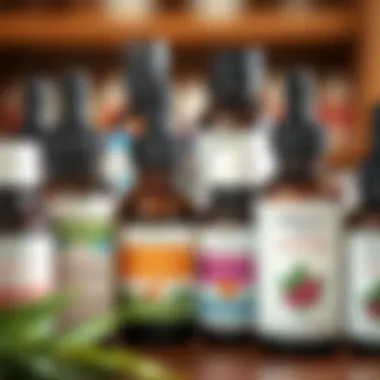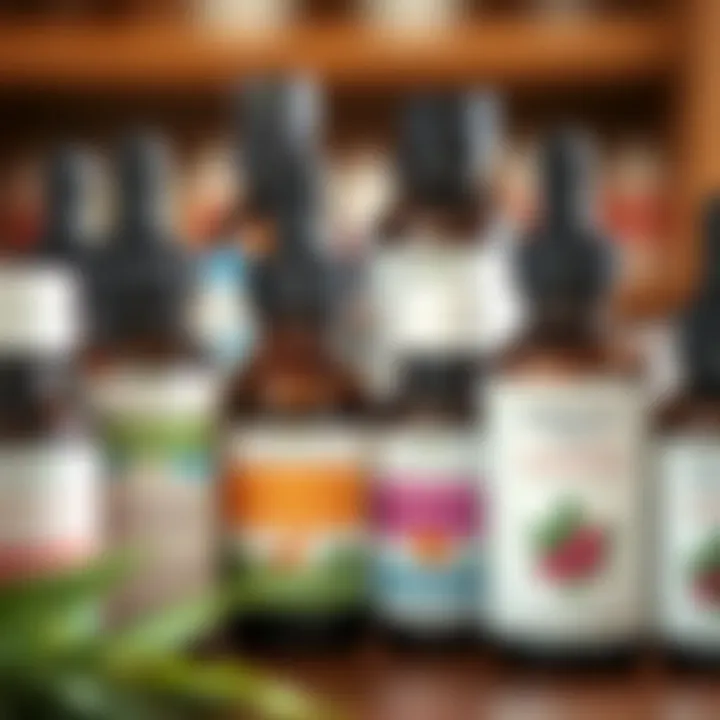Finding the Best Places to Buy Essential Oils


Intro
When it comes to health and wellness, the importance of essential oils cannot be overlooked. These natural extracts, derived from plants, have been used for centuries in various cultures. They are known for their therapeutic properties and can greatly enhance both physical and mental well-being. However, sourcing these oils properly is crucial to ensure quality and effectiveness. This article will guide you through the myriad options available for purchasing essential oils, highlighting key locations and best practices.
Understanding the Sourcing Landscape
Sourcing essential oils is not just a simple transaction. It involves understanding the origins of the oils, the extraction process, and the ethical implications of purchasing practices. With countless vendors—both local and online—it can be a real puzzle trying to identify where to invest your money wisely.
Local Shops vs. Online Platforms
- Local Shops: These can include health food stores, herbal shops, or specialized aromatherapy boutiques. Shopping locally has the added benefit of supporting small businesses and allows you to interact with knowledgeable staff. Here, you can often smell the oils before buying, which can be an invaluable experience.
- Online Platforms: Websites like Amazon or dedicated essential oil retailers offer a vast selection. While convenience is a major plus, it can be challenging to assess the quality and authenticity of products without a physical examination.
Make sure to evaluate the reputation of any online vendor or local shop. Check customer reviews and look for any certifications that may indicate a higher quality standard.
Evaluating Quality
Once you've identified potential sources for your essential oils, the next step is evaluation. You want to consider factors like:
- Purity: Look for oils that are 100% pure, with no fillers or additives. Labels like "CPTG" or "therapeutic grade" can help guide your choices, but research the brands behind these claims.
- Sourcing Practices: Ethical sourcing is key to ensuring that the practices behind your oil are sustainable. Ideally, oils should come from farmers who practice responsible farming and environmental stewardship.
- Testing: Some reputable brands provide third-party testing results. This adds a layer of transparency, helping to validate the quality of the oil you intend to purchase.
The Significance of Community Engagement
Engaging with local communities can also enhance your experience in sourcing essential oils. Workshops, local farmers' markets, and community wellness events often showcase vendors committed to quality. Participating in such events not only adds depth to your understanding but helps forge connections with those who are passionate about these oils.
Moreover, local purchasing fosters a sense of community. Supporting businesses that are part of your community creates a more sustainable cycle of trade, encouraging producers to maintain high quality in their products.
"A community that supports local businesses creates a lasting legacy of health and wellness."
Synthesizing the Information
In summary, identifying the right locations to purchase essential oils involves a mix of research, community engagement, and quality assessment. Choosing between local shops and online platforms can be a challenge. However, with proper evaluation and commitment to ethical practices, you can ensure your essential oil purchases support not only your health but also the wellness of the broader community. Keep this guide handy as you explore the scented world of essential oils, and remember: knowledge is your best ally in making informed decisions.
Understanding Essential Oils
Understanding essential oils is paramount in successfully navigating the vibrant world of aromatherapy and holistic health. These plant-derived substances have gained popularity, but what exactly fuels this fascination? Essential oils are not just fragrant liquids; they encapsulate the essence of plants, often embodying their therapeutic benefits. This connection to nature makes them invaluable, especially for those prioritizing mental health and overall wellness.
Definition and Origin
Essential oils are concentrated liquids containing volatile aroma compounds from plants. Essentially, the term "essential" relates more to the essence of the plant than its necessity. The origins of essential oils can be traced back centuries, with roots in ancient civilizations, such as Egypt and China, where they were used for religious ceremonies, personal care, and more.
The process of extracting oils is a complex one. Methods like steam distillation and cold pressing capture the plant's aromatic qualities. Not all oils are created equal; understanding the extraction method is crucial. The integrity of the essential oil relies on how it was obtained. This knowledge lays the groundwork for discerning quality, allowing you to make informed purchasing decisions.
Common Uses
The applications of essential oils are incredibly diverse, indicative of their multifaceted nature. From culinary to medicinal, and even cosmetic, the uses are widespread. For instance:
- Aromatherapy: A widely recognized practice, using diffusers to disperse scents into the air, promoting relaxation and reducing stress.
- Topical Applications: Diluted oils are often applied to skin for various benefits, such as soothing inflammation or improving appearance.
- Cleaning Products: Many individuals are turning to essential oils in making home cleaners, opting for natural cleansing agents that also smell divine.
However, not every oil fits every purpose. Distinguishing which oils are suited for specific applications is key. Research and practical experience here are beneficial.
Health Benefits
Essential oils are applauded for their myriad health benefits, tapping into the potential to enhance emotional and physical wellbeing. Commonly claimed benefits include:
- Stress Relief: Scents like lavender may evoke relaxation, quieting an overactive mind.
- Mood Enhancement: Citrus oils like orange are thought to elevate mood, sparking feelings of happiness.
- Pain Relief: Certain oils, such as peppermint, are often used in massages for their reputed anti-inflammatory properties.
"Nature itself is the best medicine." – This age-old wisdom underlies the potential of essential oils in contributing to holistic health.
Before using essential oils, especially for therapeutic purposes, it’s wise to consult with professionals. Each oil can carry unique properties and contraindications.
To well- navigate the complexities of essential oils, grasping their definitions, uses, and benefits is indispensable. A solid foundation of knowledge not only enhances personal rituals but also fosters effective communication with vendors and practitioners. Investing time in understanding essential oils leads to better decision-making when sourcing quality products.
The Importance of Quality
When it comes to purchasing essential oils, quality reigns supreme. The vast market of essential oils presents a myriad of options, but not all oils are created equal. Understanding the importance of quality is like knowing the difference between gold and fool's gold; one's worth investing in, while the other's simply a waste of time and money. High-quality essential oils can offer not only therapeutic benefits but also assurance that what you’re using aligns with ethical standards and personal health goals. Let’s dive deeper into the specifics of why quality matters.
Purity Standards
Purity is the cornerstone of any quality essential oil. It's imperative to choose oils that are 100% pure, as adulterants can diminish their efficacy and could even pose risks to your health. Purity standards vary widely across the industry; however, certifications such as those from the International Organization for Standardization (ISO) and the Essential Oil Safety (EOS) guidelines provide a level of assurance. Here are a few considerations for purity:


- Label Transparency: Look for labels that clearly state the botanical name, extraction method, and country of origin. If the label has vague information, it might be worth passing up.
- Testing Procedures: Some reputable producers submit their oils for third-party testing, a practice that can assure you of the quality and provide detailed analyses, like Gas Chromatography reports.
- Essential Oil Scams: Be cautious of oils sold at rock-bottom prices — if it seems too good to be true, it is. Quality essential oils involve laborious extraction processes, and therefore come with a price tag that reflects the true craftsmanship.
Distillation Processes
The method of extraction plays a significant role in determining the quality of essential oils. Different distillation processes can yield varied profiles in the final product. Here are a few common methods:
- Steam Distillation: This is the most prevalent technique and can result in high-quality oils. The plant material is subjected to steam, which extracts the essential oil without damaging its components.
- Cold Pressing: Often used for citrus oils, this method involves mechanically extracting the oil from the fruit's rind. It's generally favored for its ability to maintain the aroma and flavor of the oil.
- Solvent Extraction: While effective, this method can leave behind chemical residues, so it’s not generally preferred for medicinal purposes. Oils derived this way are often labeled as "absolutes" instead of "essential oils."
Understanding these processes can arm you with knowledge to pick oils that truly deliver on their promises. When in doubt, consult industry resources or those who have cultivated experience in sourcing high-quality oils.
Sourcing Transparency
Sourcing transparency is becoming increasingly crucial for consumers looking to make ethical choices. This refers to knowing where the oils come from and how they are produced. Ethical sourcing ensures that the oils are harvested responsibly and that growers are compensated fairly. A few key points to consider include:
- Fair Trade Practices: Essential oils sourced through fair trade are generally a safe bet, as they support sustainable farming and provide fair wages to the workers involved in the production.
- Wildcrafted vs. Cultivated: While wildcrafted oils can often be of higher quality due to a natural growing environment, cultivated oils can be more sustainable, preventing overharvesting and maintaining balance in local ecosystems.
- Brand Values: Research the brand’s commitment to sustainable practices. Companies that openly share their sourcing process demonstrate a dedication to ethical consumption, providing you peace of mind with each drop of oil you use.
"Quality isn't expensive; it's priceless."
Local Options for Purchase
Choosing where to buy essential oils can significantly affect the quality and experience you have with these products. With the growing popularity of essential oils, understanding the local purchasing landscape is crucial. Local options not only give you the ability to smell and test the oils before making a decision, but they often foster a connection with the community and support local economies. Being part of a local buying experience allows for greater transparency regarding the sources and practices behind the oils. This section will guide you through various local options, emphasizing the importance of supporting local businesses while making informed decisions.
Health Food Stores
Health food stores are often the hidden gems when it comes to sourcing quality essential oils. These shops typically focus on wellness products, so essential oils are usually part of their inventory. The staff here can provide valuable insights, helping you select the right oils based on your needs and preferences. In many instances, these stores prioritize sustainability and offer organic options, aligning well with an eco-conscious buyer's values. However, it’s essential to check the labels and perhaps inquire about certifications, as not all health food stores uphold the same standards regarding essential oils.
Farmers' Markets
Farmers' markets bring a rich array of benefits, not only for essential oils but also for the community. They often feature local producers who are passionate about their products and aim for sustainable, organic practices.
Benefits of Local Sourcing
Acquiring essential oils from local markets ensures fresher products. Local sourcing reduces transportation costs and environmental footprint, making these oils potentially more potent. Moreover, buying locally supports small farms and businesses, which helps strengthen the local economy. Here are some key characteristics:
- Freshness: The proximity of the source likely means you’re getting oils closer to the extraction time.
- Quality Control: Often, small-scale producers are more engaged in their products, leading to better practices.
- Connection: You can directly ask questions about the oils and build relationships with the sellers.
However, selection may be more limited than in larger retail environments, so it’s wise to visit several markets to find various offerings.
Supporting Local Farmers
When you choose to buy essential oils from local farmers, you're not just making a purchase; you’re making a statement about where you want your money to go. Supporting local farmers helps sustain agricultural practices and encourages biodiversity, while also potentially enhancing your own well-being through the use of pure, less processed oils. Here’s why this choice resonates:
- Cultivation Practices: Local farmers may use traditional methods that are less harmful to the earth.
- Community Impact: Your purchase directly contributes to the livelihoods of local families, fostering a resilient community.
- Taste and Aroma: Oils that are locally produced often hold richer aromas as they haven’t traveled far from their source.
On the downside, you might face higher prices due to smaller production scales, and availability may vary seasonally.
Specialty Shops
Specialty shops often carry a diverse selection of essential oils and related products, appealing to connoisseurs and newcomers alike. These stores often have a curated collection of high-quality oils that have passed through rigorous sourcing standards, making them a dependable choice for buyers.
Understanding the Retail Environment
Navigating the retail environment of specialty shops involves recognizing that these spaces prioritize both education and experience. Staff typically have significant knowledge of the different oils, their uses, and benefits, which can enhance the shopping experience.
- Informed Choices: You have access to staff who can explain the nuances of various oils and help you select the best options for your individual needs.
- Quality Focused: Many specialty shops prioritize sourcing from reputable producers, ensuring a greater degree of quality control.
- Community Feel: Shopping at these stores can feel more personable rather than transactional, fostering a sense of community.
However, the prices can be higher than regular retail outlets as they focus on quality over quantity.
Expert Recommendations
Often, the value of visiting specialty shops lies in the recommendations provided by experienced staff or other customers. This can lead to discovering lesser-known oils that suit your purpose perfectly. Specialty shops often hold workshops or sessions where experts share their knowledge, giving you the opportunity to explore oils in-depth. Some notable points:
- Curated Selections: You are less likely to find low-quality or diluted products.
- Trust Building: Establishing a rapport with staff can lead to better recommendations catered to your lifestyle or health goals.
- Experience Sharing: You can engage with others who share your interest, potentially leading to building a community around essential oil usage.
In contrast, the additional layer of trust in recommendation comes with the responsibility of making sure you align with their expertise, as selection can still vary.
"Purchasing from local sources not only elevates your essential oil experience but also nurtures the community they're a part of."
In summation, focusing on local options for purchasing essential oils can unveil rich benefits. From farmers’ markets to specialty shops, these venues offer unique attributes that align well with sustainable consumption and community support.
Online Shopping for Essential Oils


In today’s fast-paced world, online shopping has transformed how we acquire various products, including essential oils. The convenience and accessibility of purchasing oils from the comfort of your home cannot be overstated. Not only can you browse through a plethora of options, but you also have the liberty to compare prices, read reviews, and delve into the nuances of different brands. This section underscores why online shopping is a viable avenue for sourcing high-quality essential oils.
Reputable Online Retailers
When it comes to buying essential oils online, ensuring that you are purchasing from reputable retailers is crucial. Some well-known names in the field include Young Living and doTERRA, which are recognized for their extensive testing and commitment to purity. Like a well-tuned watch, these brands stand the test of time due to their emphasis on transparency and quality.
Reputable retailers provide detailed information regarding sourcing practices, extraction methods, and third-party testing results. Knowing that a retailer's reputation is on the line can also translate into peace of mind for consumers who are sometimes bewildered by the market full of options. Additionally, well-reviewed sites often have strong return policies, which can protect your investment if the product does not meet your expectations.
Comparison Shopping Tips
Analyzing Reviews
When considering essential oils, diving into reviews serves as a valuable tool in your shopping arsenal. Reviews offer insights from fellow consumers who have already tread the path you’re about to embark on. A common trait of reliable reviews is their relatability; you can often find experiences that resonate with your personal needs.
For instance, if you are looking for lavender oil with calming properties, a review that mentions not just the scent but also its effectiveness for stress relief can be particularly helpful. However, it's essential to be mindful of fake reviews; therefore, look for those that tackle both positives and negatives in an authentic manner. Informed shopping brings about satisfaction!
Price Variability
Price variability is another focal point when buying essential oils online. Prices can fluctuate significantly based on factors such as brand reputation, sourcing, and packaging. A noteworthy characteristic of this variability is that it’s often tied to the purity and quality of the oil. Higher prices may indicate a product that is more genuinely sourced or who uses better extraction techniques, whereas off-brand oils may tempt buyers with low prices but can fall flat in quality.
Always be cautious while navigating this landscape. Waiting for special promotions or discounts from established brands can lead to better deals without sacrificing quality. Thus, maintaining a vigilant eye on price trends can ultimately lead to valuable purchases.
Subscription Services
Benefits of Regular Deliveries
Opting for subscription services for essential oils is a practical solution for avid users. Many retailers offer auto-shipping options that deliver products right to your doorstep at regular intervals. One of the most significant advantages of this arrangement is the convenience; you never have to worry about running out of your favorite scents.
Furthermore, these services usually provide discounts for subscribers, making it a wallet-friendly choice for frequent buyers. Since established companies often prioritize customer satisfaction, subscribers often benefit from first access to new blends or limited editions, elevating the experience even further.
Exploring New Scents
Subscription services also encourage exploration. When you sign up, you might receive samples of new scents or blends you wouldn't have otherwise considered. This characteristic fosters a sense of adventure, pushing you to step outside your usual choices, and giving your olfactory senses a variety of experiences.
The downside could be an overwhelming influx of oil, if you opt for irregular ordering, or perhaps you may find a few scents that really don’t resonate with you. Nevertheless, the opportunity to discover unique scent profiles is a compelling reason to consider this approach while shopping online.
"The opportunity to explore new scents without leaving your home is simply immense."
Pricing Considerations
Pricing is a critical component when it comes to procuring essential oils. Understanding the cost dynamics can empower you to make wiser purchasing decisions. The prices of essential oils can fluctuate significantly based on various elements like the source, quality, and production methods. When you dive into pricing, you’re not just looking at the numbers; you’re diving into what those figures represent regarding quality and value.
Understanding Price Points
Essential oils are available at a variety of price points, and familiarity with them can aid in making informed choices. On one end, you might find budget-friendly options at health food stores or online retailers. These oils might be appealing for first-time buyers or those hesitant to invest heavily. However, understanding that a lower price often correlates with lower purity can help you tread carefully.
On the higher end, you’ll discover premium oils sourced from reputable suppliers who value careful extraction processes. Not only do these premium oils often boast enhanced therapeutic properties, but they also come with certifications that prove their quality. Thus, when considering price points, weigh them against what you know about the brand and the production techniques they employ.
Bargains and Deals
When looking for bargains, keep an eye out for seasonal sales or promotional events from your favorite retailers. Many stores offer discounts during certain times of the year, which can be an opportune moment to stock up on your preferred essential oils. Moreover, subscription services sometimes provide reduced rates for consistent purchases.
But, be cautious. A price that seems too good to be true likely is. Before you jump at a discount, ensure the supplier’s integrity and check for customer feedback. Swapping quality for a lower price can lead to regret further down the line, especially if the oil doesn’t meet your needs or expectations.
Evaluating Value
The concept of value extends beyond just the price tag attached to a product. Evaluating the value of essential oils you purchase involves considering several factors:
- Purity Levels: Is the oil 100% pure, or is it diluted with cheaper carriers?
- Sourcing Practices: Was the oil ethically sourced? This can add to its overall worth.
- Brand Transparency: Brands that openly share their distillation processes and sourcing information tend to command higher value.
A well-informed decision hinges on understanding the harmony between what you pay and what you receive. Investing a bit more in reputable brands can result in a more effective and pleasurable experience with essential oils.
"In the world of essential oils, cheap often translates to low quality, and substituting good judgment for a quick deal can cost you more in the long run."
By grasping the nuances of pricing considerations, you’ll navigate the labyrinth of essential oils with greater ease, leading to selections that align with your needs and values.
For more information on the nuances of essential oil pricing, you might consider visiting Wikipedia or checking marketplaces like Reddit for community insights.
Identifying Reputable Retailers
In the realm of essential oils, knowing where to buy your products can make a world of difference. With the market flooded with options, discerning between the genuine quality and mere marketing fluff is crucial. Not every bottle of oil labeled as "pure" is what it claims to be. Thus, identifying reputable retailers is not just a shopping tip; it's a vital step towards ensuring the effectiveness, safety, and therapeutic benefit of the oils you choose to incorporate into your wellness routine. The right retailer can provide transparency in sourcing, quality assurance, and expert advice tailored to your needs.


Certifications and Labels
Certifications and labels often serve as the first line of defense in distinguishing high-quality essential oils from subpar alternatives. Various organizations offer certifications that ensure products meet specific safety, quality, and ethical standards. When browsing, look for labels like "USDA Organic," which indicates that the oils are derived from plants grown without harmful pesticides or synthetic fertilizers.
Another notable certification is the "ISO" label, which adheres to international quality management standards. Furthermore, retailers might display third-party testing results, a vital element to confirm the purity and chemical composition of the oils. Here's a quick list of certifications to watch out for:
- USDA Organic
- ISO Certified
- EcoCert
- Fair Trade Certified
By choosing products with these certifications, you invest in quality and promote responsible sourcing practices within the essential oils industry.
Customer Feedback
Never underestimate the power of customer feedback. In today's digital age, reviews can be a goldmine of information. Engaging with customer experiences provides insight into both the product and the retailer. While all reviews should be taken with a grain of salt—some could reflect personal biases or anecdotal experiences—trends often emerge that speak volumes about the quality of the oils sold and the reliability of the retailer.
Look for retailers that consistently receive positive feedback, focusing on reviews that highlight:
- Purity and effectiveness of the oils
- Customer service experiences
- Transparency regarding sourcing and production methods
A retailer that takes criticism constructively and engages with its customers shows a commitment to quality and improvement that can set it apart in a crowded market.
Return Policies
In the world of essential oils, a generous return policy is a strong indicator of a retailer’s confidence in their products. After all, what if the oil you selected doesn’t resonate with you? A straightforward return process not only assures consumers but also fosters trust. When you’re willing to invest in essential oils for your mental health and wellness, knowing you can return a product if it doesn’t meet your expectations is comforting.
Consider the following aspects of return policies when evaluating retailers:
- Time Frame: A retailer that offers a longer window for returns might have confidence in their product.
- Conditions: Assess any stipulations that could complicate returns. For example, unopened items are easier to return than used ones.
- Refunds vs. Store Credit: Understand your options if you decide to return a product. A retailer offering refunds may prioritize customer satisfaction over retention.
By paying attention to certifications, customer feedback, and return policies, you can make informed choices that contribute to finding the best essential oils available. This proactive approach aids in enhancing your holistic practices while maintaining integrity in your buying habits.
Community Engagement
Community engagement plays a pivotal role in the landscape of sourcing essential oils. It not only enhances the buying experience but also aligns your purchase with ethical considerations and local support. When you actively participate in your community's wellness journey, you foster connections that enrich both your personal and communal health.
Building relationships within your community can lead to access to unique products that might not be available through mainstream suppliers. Local artisans and farmers often offer handcrafted essential oils that reflect their dedication and expertise. By supporting these individuals, you're not just buying oil; you're investing in their craft and the local economy.
Additionally, community engagement encourages a culture of sharing knowledge and resources. Workshops and classes often held locally can provide practical insights into essential oil usage, benefits, and applications. By learning alongside fellow enthusiasts, you can broaden your understanding and discover new ways to incorporate essential oils into your daily life.
Local Workshops and Classes
Attending local workshops and classes is an excellent way to deepen your understanding of essential oils. These venues typically offer interactive experiences that enable learners of all levels to participate actively. Instead of passively absorbing information, you could blend your own oils, learn about the distillation process, and even understand the science behind aroma therapy.
Participating in these sessions often allows for hands-on learning, where you can smell, feel, and even test the oils. You could ask questions directly to experts in the field, getting immediate feedback on your inquiries.
Moreover, workshops often provide an atmosphere of camaraderie. You’ll meet people who share your interests and values, creating bonds that can lead to further collaboration. From joint purchases to exchanging tips, the connections made in such spaces are invaluable.
Building a Network
Establishing a network centered around essential oils can be significantly beneficial for those who prioritize mental health and wellness. Consider forming or joining groups that emphasize wellness through natural means. This could be a book club focused on health books, an aromatherapy circle, or even a simple meet-up to discuss oils and their effects.
Your network can also serve as a resource for recommendations on where to buy high-quality essential oils. When experiences and tips are shared, it creates a wealth of knowledge that you wouldn’t access alone. It’s like having a personal advisory board at your disposal.
Moreover, expanding your network opens the door to collaborative initiatives. You might find opportunities for joint ventures in sourcing oils sustainably or organizing community events that spread awareness about the benefits of aromatherapy. By aligning with like-minded individuals, you can amplify your impact while learning from the collective insights gathered through shared experiences.
Community engagement in essential oil sourcing not only supports local economies but also enriches personal connections and knowledge.
In summary, community engagement is vital for anyone looking to purchase essential oils. From local workshops to networking opportunities, engaging with others enhances your understanding and appreciation of these powerful tools for wellness.
The End and Recommendations
As we draw this exploration to a close, it's vital to recognize that purchasing essential oils involves a multifaceted approach. This article has sought not only to inform but to empower readers to make educated choices in their quest for high-quality essential oils. The emphasis on sourcing practices, retailer reputations, and community engagement is not merely a philosophical stance; it’s a practical framework that can lead to substantial benefits for users and the environment alike.
In considering your own journey in selecting essential oils, keep in mind a few key elements. First, acknowledge the importance of purchasing from reputable sources. Quality oils can dramatically impact your experiences, whether they’re for therapeutic purposes, home fragrance, or personal care applications. Engaging with local businesses, sourcing oils that are cultivated sustainably, and taking the time to ask questions shows a commitment to not just personal well-being but also to ethical consumption practices. When every purchase aligns with these values, it not only enhances individual health but contributes to more responsible consumer habits overall.
Summarizing Key Points
This article has ventured through several essential aspects:
- Understanding Essential Oils: Here, we've defined what essential oils are, their origins, common uses, and noted the range of health benefits they can provide.
- Quality Matters: Emphasized the necessity of understanding purity standards, distillation processes, and the importance of sourcing transparency. High-quality oils offer the maximum benefits.
- Local vs Online Options: We weighed the pros and cons of purchasing oils locally in health food stores and farmers' markets against the convenience of online retailers. Each method holds unique advantages regarding sourcing and expertise.
- Pricing Understanding: It’s crucial to determine value over mere cost, highlighting bargains while assessing true price points in the market.
- Identifying Reputable Retailers: We discussed various certifications and labels to look for, the weight of customer feedback, and the considerations around return policies.
- Community Engagement: Recognized how workshops and local networks can greatly enhance your knowledge and help foster a sense of community.
By keeping these points at the forefront of your purchasing decisions, you can navigate the realms of essential oils with confidence and clarity.
Final Thoughts on Essential Oil Purchase
Ultimately, the journey into the world of essential oils should not feel overwhelming. With the right tools and knowledge, you can turn the process into a rewarding pursuit that nurtures both your well-being and your values. In a society increasingly conscious about health and ethical consumption, finding the optimal locations for purchasing essential oils takes on even greater significance.
Remember to trust your instincts. Whether you lean toward the charm of a local shop or the vast offerings found online, align your choices with your values and needs. You might find that the best essential oil for you is not just one that scents your space perfectly but embodies a commitment to sustainability and quality. For those delving deeper into this aromatic journey, consider resources like Wikipedia and Britannica for more scholarly insights into essential oils and their uses.















